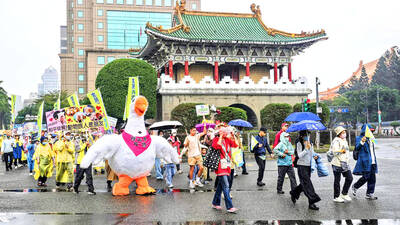The Ministry of National Defense yesterday presented its evaluation and review of the annual Han Kuang military exercises to the legislature's National Defense Committee, and urged lawmakers to approve the long-delayed arms procurement budget.
"It is necessary to approve and carry out the arms procurement proposal as soon as possible if we want to defend ourselves from potential attacks by Chinese guided missiles and submarines," the report concluded.
MISSILE FAILURES
Six missiles of various types that failed shortly after launch during the live-fire portion of the this year's exercises were the focus of the report.
The ministry said that the performance of the personnel participating in the activity was satisfactory, but that the missiles had failed because the military did not have enough funding to keep its equipment up to date.
In the meantime, the report also mentioned that it is the ministry's plan to train more career military personnel to operate and maintain high-tech equipment such as the missiles operations systems.
VUNERABILITIES
In addition to the missile failures, the report also said that the military does not have enough anti-submarine and anti-vessel missiles, which will make the military vulnerable when facing challenges from the sea.
The report also described holes in the nation's air defenses, saying the country does not have enough maritime patrol or fighter aircraft.
STALLED ARMS PACKAGE
A major US arms procurement proposal -- to purchase PAC-3 anti-missile batteries, 12 P-3C maritime patrol aircraft and eight diesel-electric submarines -- has been stuck in the legislature since 2003.
The package was originally estimated at NT$610.8 billion (US$18.45 billion), but was soon reduced to NT$590 billion and then to NT$480 billion because of changes in currency exchange rates.
The Cabinet has now asked for NT$6.2 billion in supplemental funding to jumpstart procurement of some of the items, but the proposal is still blocked in the legislature.

NUMBERS IMBALANCE: More than 4 million Taiwanese have visited China this year, while only about half a million Chinese have visited here Beijing has yet to respond to Taiwan’s requests for negotiation over matters related to the recovery of cross-strait tourism, the Tourism Administration said yesterday. Taiwan’s tourism authority issued the statement after Chinese-language daily the China Times reported yesterday that the government’s policy of banning group tours to China does not stop Taiwanese from visiting the country. As of October, more than 4.2 million had traveled to China this year, exceeding last year. Beijing estimated the number of Taiwanese tourists in China could reach 4.5 million this year. By contrast, only 500,000 Chinese tourists are expected in Taiwan, the report said. The report

Temperatures are forecast to drop steadily as a continental cold air mass moves across Taiwan, with some areas also likely to see heavy rainfall, the Central Weather Administration (CWA) said. From today through early tomorrow, a cold air mass would keep temperatures low across central and northern Taiwan, and the eastern half of Taiwan proper, with isolated brief showers forecast along Keelung’s north coast, Taipei and New Taipei City’s mountainous areas and eastern Taiwan, it said. Lows of 11°C to 15°C are forecast in central and northern Taiwan, Yilan County, and the outlying Kinmen and Lienchiang (Matsu) counties, and 14°C to 17°C

STEERING FAILURE: The first boat of its class is experiencing teething issues as it readies for acceptance by the navy, according to a recent story about rudder failure The Hai Kun (海鯤), the nation’s first locally built submarine, allegedly suffered a total failure of stern hydraulic systems during the second round of sea acceptance trials on June 26, and sailors were forced to manually operate the X-rudder to turn the submarine and return to port, news Web site Mirror Daily reported yesterday. The report said that tugboats following the Hai Kun assisted the submarine in avoiding collisions with other ships due to the X-rudder malfunctioning. At the time of the report, the submarine had completed its trials and was scheduled to begin diving and surfacing tests in shallow areas. The X-rudder,

DEMAND: The government should enact regulations in line with Austria and Germany to incorporate vegan nutrition into school meals, an advocate said More than 1,000 people yesterday marched in Taipei to promote veganism, calling for legislation to incorporate vegan diets into school lunches and the national net zero emissions program. Participants gathered on Ketagalan Boulevard in front of the Presidential Office Building for the march, which was organized by the Vegan Action Network (VAN). Former ambassador to Chad Chiu Chung-jen (邱仲仁), actor Yankee Yang (楊子儀) and actress Cindy Lien (連俞涵) attended the event. VAN member Marianne Chao (趙梅君) said that the campaign aimed to urge the government to promote vegan diets across schools and government agencies via legislation and national policies, which would help build